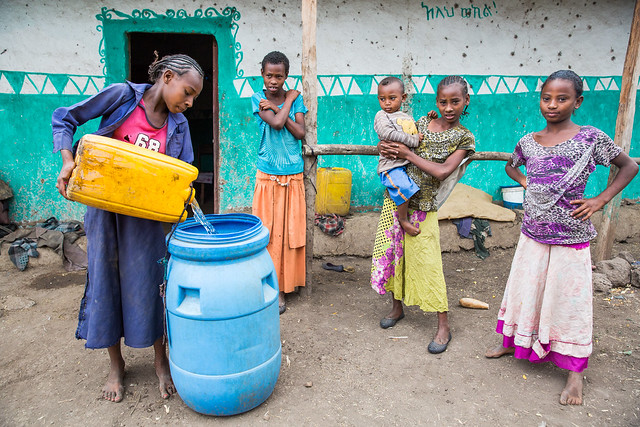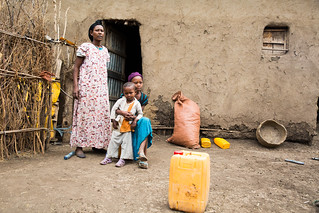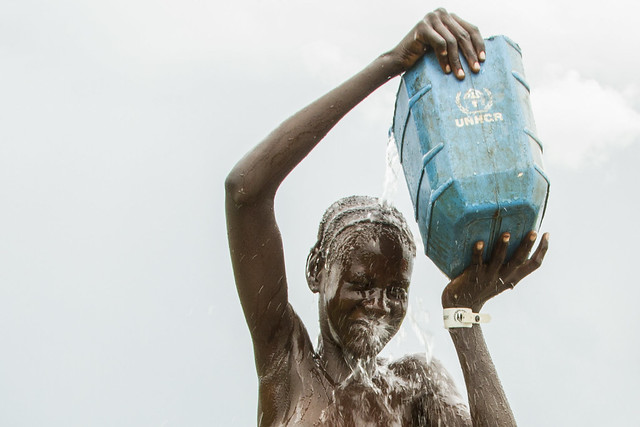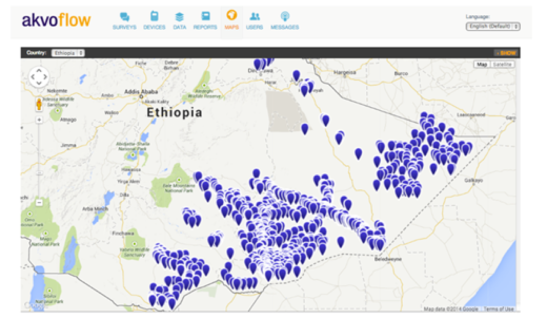By Araya Mengistu

For the community in Lode Lemofo Kebele, Sire Woreda in the Arsi Zone of the Great Rift Valley of Ethiopia, access to water was an ongoing problem. During the annual dry seasons in this hot, low-land area, community members had to walk for hours under a blazing sun just to get water.
In January 2016, the communities of Lode Lemofo and neighbouring Chenge Kebeles have seen a marked improvement in their day-to-day lives, thanks to a water supply project that was commissioned and constructed with UNICEF support. About 6,500 people in two Kebeles, particularly the 3,250 women and girls who are usually charged with collecting water for household use, are reaping the benefits of improved access to clean and safe water, including increased school attendance among children.

Lode Lemofo community member Yesunesh, mother of 10-year-old Genet and two-year-old Samuel, says, “Fetching water used to be the most demanding task we had to endure on a daily basis. Sometimes we had to do it twice a day. It is very tiring and takes up to three hours to and from the river. At times it is also dangerous, because sometimes hyenas try to attack us or our donkeys.”
The lack of access to water also affected health centres and schools. Communities had to support the provision of water in these facilities themselves. Visiting patients and members of neighbouring households carried water to health centres while school girls and boys carried water to school on a daily basis.
All this has changed when the new water supply scheme became operational. The scheme draws its source from a 265-metre deep well and includes 16 kilometres of pipe network, 11 water distribution points and a 100,000-litre reservoir. One primary school and one health centre have also been connected to the water distribution system.
Yesunesh underscores the difference the scheme has made, saying, “All that suffering is now gone. My girl Genet – as you have seen – can get the water we need for cooking and other household use in less than ten minutes.”
Health centres can now provide better care to community members, particularly pregnant women, while boys and girls are better able to learn at school.
In total, 24 other Woredas in Oromia Regional State are benefitting from UNICEF’s water and sanitation programme. This is part of the overall progress in water and sanitation in Ethiopia, where 57 per cent of the population now relies on improved water supply sources such as water taps or hand pumps, rather than unprotected and risky sources such as rivers and streams. This increased access to clean and safe water has benefitted the children of Ethiopia tremendously, contributing to the reduction of under-five child mortality by two-thirds and the significant reduction of child stunting.


 The software used was developed by the Dutch foundation AKVO using the AKVO flow system. Despite battery charging and internet challenges in the region, the new technology has been proven successful. Trained enumerators would collect data from households and visit water points, entering the data directly into previously uploaded survey forms on the mobile phone.
The software used was developed by the Dutch foundation AKVO using the AKVO flow system. Despite battery charging and internet challenges in the region, the new technology has been proven successful. Trained enumerators would collect data from households and visit water points, entering the data directly into previously uploaded survey forms on the mobile phone. Everyone with granted access to the cloud/dashboard can view the data, extract it in Excel sheets, visualise the data in pie charts and graphs and most importantly see the exact location of water points on maps.
Everyone with granted access to the cloud/dashboard can view the data, extract it in Excel sheets, visualise the data in pie charts and graphs and most importantly see the exact location of water points on maps.

